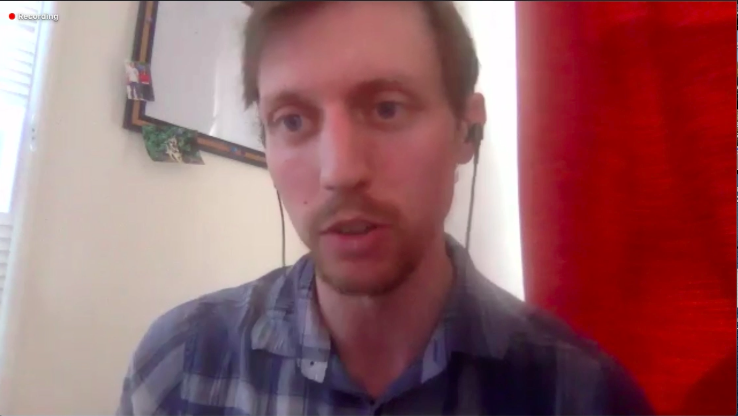
The red carpet at Cannes Film Festival is packed with photographers on either side. Celebrities are lined up getting their photos taken.
Spike Lee, Adam Driver and the rest of the cast from “BlacKkKlansman” are lined up, posing for the photographers.
Behind them, trying to get in the photos, are screenwriters David Rabinowitz and Charlie Wachtel. Their heads peak through behind the cast.
Rabinowitz may not be as recognizable as the famed director and A-list actor, but his star as a top writer is on the rise.
That’s because he and a team of screenwriters won the Oscar for Best Adapted Screenplay for his work on “BlacKkKlansman” in 2019.
He discussed his life and career in a Zoom event organized by the Media Arts Department and the Pierce College Film Club on May 18.
Rabinowitz said his advice for screenwriters is to not give up and concentrate on the process of making something rather than hoping for a specific result.
“If it’s focused on a result, then you’re just going to be in a constant state of failure until you reach that milestone,” Rabinowitz said. “If you do happen to reach that milestone, you’re going to move the goalposts and you’re going to create something else and then you’re a failure once again.”
The Cannes audience tends to either praise a film or boo at it, according to journalism instructor Sean Collins-Smith, who arranged the event.
“BlacKkKlansman” received a standing ovation.
Communications professor Barbara Anderson wrote in an email that she enjoyed how Rabinowitz described what it was like at Cannes.
“I felt like we could all identify with how surreal that must have felt for him, and by extension, how our students could have a similar surreal, dream come true,” Anderson wrote.
After “BlacKkKlansman” won the Oscar, Rabinowitz said he was overwhelmed with shock.
“I kind of blacked out between that moment and getting up on stage and I was very thankful that I didn’t have to say anything,” Rabinowitz said.
He said it was good that he had no expectation of winning an Oscar while writing the script.
“I’m glad I had no idea that was going to come because it would have paralyzed the process,” Rabinowitz said.
“BlacKkKlansman” is not the first script he wrote, but it is the first one that he sold.
He said he and Wachtel took some creative liberties when writing the script.
“Real life isn’t structured in three acts and can’t be properly summarized in two hours,” Rabinowitz said. “You have to make some choices right off the bat and you have to make it honestly. There’s nuance to this, but I feel like your responsibility as a filmmaker is to the film, not necessarily to the true events.”
Rabinowitz started creative writing during second grade and eventually started writing scripts when he was around 17. He then worked in the video department of the Wall Street Journal before moving to Los Angeles with Wachtel in 2012.
“I decided to load up my 1997 Toyota Corolla with everything I owned, and drive across the country,” Rabinowitz said.
Wachtel was the one who found Ron Stallworth’s memoir “BlacKkKlansman.” He and Rabinowitz made a “handshake deal” with Stallworth to get permission to turn the biography into a script, Rabinowitz said.
“We basically put our trust in him, and he put his trust in us,” Rabinowitz said.
At the time, Wachtel was an assistant to producer Shaun Redick, an executive producer on “Get Out.” Because of networking, Rabinowitz and Wachtel got to pitch the script to Redick, who shared it with “Get Out” director Jordan Peele.
Peele, who thought “BlacKkKlansman” had a similar theme to “Get Out,” then became one of the producers for the film.
“A really super lucky confluence of events helped us out there,” Rabinowitz said.
Collins-Smith conducted a brief interview with Rabinowitz before Rabinowitz answered student questions. Collins-Smith asked about how much the film’s themes surrounding racism and social justice played into the writing of it.
“This is a film that is not only inherently high stakes and high concept, it’s also inherently sociopolitical,” Collins-Smith said. “It’s going to be almost like the equivalent of eating your vegetables because you almost can’t escape it. There’s going to be an inherent message in this thing.”
In response, Rabinowitz said the focus was mainly on the genre when he was writing.
“We wanted to make an undercover thriller with absurdist elements,” Rabinowitz said. “That was our main goal. We were thinking our script would have those political elements, but we kind of leave them unsaid or let them be matter-of-fact.”
Rabinowitz answered questions from film students and aspiring screenwriters and discussed the process of writing a script and selling it.
My Pham, computer science student at University of California, Santa Cruz, said in a phone interview that despite not being a film student, she attended the event because she liked the movie.
“I thought it was very insightful,” Pham said. “Learning about the time and process it takes to get a script out and into production was new and interesting to me.”
Anderson said that overall, she loved the event and the way Rabinowitz discussed his life.
“He seemed to be so honest and transparent in sharing his story,” Anderson wrote. “It was storytelling at its best.”
Rabinowitz said he wrote several bad scripts before writing “BlacKkKlansman.” He said creative people should keep working because quantity leads to quality.
“Allowing yourself to be bad is great, and not judging yourself, because when you start judging the work too much, that prevents you from doing the work,” Rabinowitz said.




